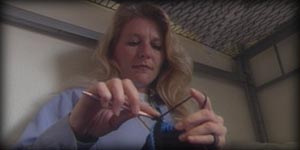|
INTERVIEWER
What was your involvement with marijuana? Did you use it?
ISRAEL
The man that I met was a Rastafarian and used marijuana for religious
purposes. Marijuana wasn't my thing. I didn't smoke marijuana. I didn't
enjoy marijuana, but he did. They smoked a lot of marijuana, him and his
friends, it was a sacred thing for them. He wasn't growing marijuana;
evidently, they were buying it.
INTERVIEWER
Tell me what happened with the arrest.
ISRAEL
The FBI rounded up--it was called Reggae North--it was against the Rastafarian
religion, religious group in Billings, Montana. And they targeted this group
because they knew they smoked marijuana. And they made it into something way
bigger than it was. We were arrested, we went to trial, and the government
offered several deals to people, for their cooperation in testifying. They were
given no time, or virtually no time at all.
They offered me ten years, at one point, if I would testify against someone
outside of the group. Somewhere it's got to stop. If I was to testify against
someone and bring down ten people, it's got to stop somewhere. I don't feel
it's right for me to go free and bring ten people down to drag them away from
their families and loved ones over trumped up charges.
INTERVIEWER
What happened to you?
ISRAEL
Well, I got eleven years, three months in the federal prison. Because
I lived with this man, the jury felt that I had knowledge, and I also
felt that the jury felt that if the government [was] saying this [it] must be true.
INTERVIEWER
Was this a mandatory minimum?
ISRAEL
Yes, it was a mandatory minimum, I got it on the conspiracy charge. The
problem with conspiracy is it's the only time they allow hearsay into the
courtroom. So, if they can't get you for anything else, they can get you for
conspiracy. Your husband could go away on a business trip for the weekend, and
come back home, and he could have been out buying drugs, and you're going to be
charged.
INTERVIEWER
A lot of people listening to this would think--how could you make that choice
and leave your kids when you were weighing your decision about what to do?
What was going through your mind?
ISRAEL
I never imagined that the jury would find me guilty. I thought there would be
justice, and I really believed in our system until I went through this. I
still have hope that justice will be served.
INTERVIEWER
You are appealing?
ISRAEL
Yes, I have a 2255 motion that'll be going in and I'm hoping for some kind
of a reduction.
INTERVIEWER
What's happening with your children?
ISRAEL
 When I came in my children were one, two, and my three-year-old had just turned
four, and my daughter was nine. They're all in different homes and my
littlest son doesn't even know who I am. It's hard because as a parent you
want to protect your child from hurt. And it's like I have caused this hurt,
so it's really hard. When I came in my children were one, two, and my three-year-old had just turned
four, and my daughter was nine. They're all in different homes and my
littlest son doesn't even know who I am. It's hard because as a parent you
want to protect your child from hurt. And it's like I have caused this hurt,
so it's really hard.
INTERVIEWER
Do you blame yourself?
ISRAEL
Well, I blame myself for the choice that I made and the man that I was with.
I can't be responsible for another adult's actions. I can only be
responsible for my own. That's what I thought. But I was wrong because
conspiracy doesn't work that way.
INTERVIEWER
How often do you see your kids?
ISRAEL
I see them once a year. Every summer my mom brings them up.
INTERVIEWER
What do you tell them about the situation?
ISRAEL
Well, now that they're getting a little bigger, it's easier. When I first came
in, they were all so small, it was hard for them to understand that I couldn't
be with them, that I wanted to, but I couldn't. And now at least they
understand, but my littlest girl would wake up in the night screaming for me,
"Mom," ... I think they felt like I abandoned them. So, now they
understand I don't want to be here, but I have to be.
INTERVIEWER
What are your feelings about marijuana?
ISRAEL
I don't smoke marijuana, and I don't enjoy marijuana. But I don't see why
it's illegal. I know we had a prohibition on alcohol, years ago, and I believe
marijuana is where alcohol was then. It grows from a seed in the ground, it's
natural, it's not refined, it's not processed. They dry it and they smoke it.
INTERVIEWER
People who are against drugs, marijuana, would say you were with him, you knew
he was breaking the law, you should be punished. What would you say to those
people?
ISRAEL
I can only be responsible for myself. I made a mistake in that I chose the
wrong man. But eleven years of my life away from my children isn't right.
INTERVIEWER
Tell me exactly what you were sentenced to, and how much time.
ISRAEL
I was sentenced to eleven years and three months, which means I will do over
nine and a half years before I will be eligible to go home. In federal ...
you do 85% of your time, which is more than a
murderer would get. You can go out and kill somebody, the average is eight
years. We haven't hurt anyone. It's a victimless crime.
INTERVIEWER
No chance of parole?
ISRAEL
No parole. First time I've ever been in trouble.
INTERVIEWER
Could you explain your appeal?
ISRAEL
The motion I'm filing would be for a sentence reduction for ineffective
assistance of counsel. My lawyer had made a deal in the judge's chambers, and
I wasn't aware of it. And it hampered my defense.

|